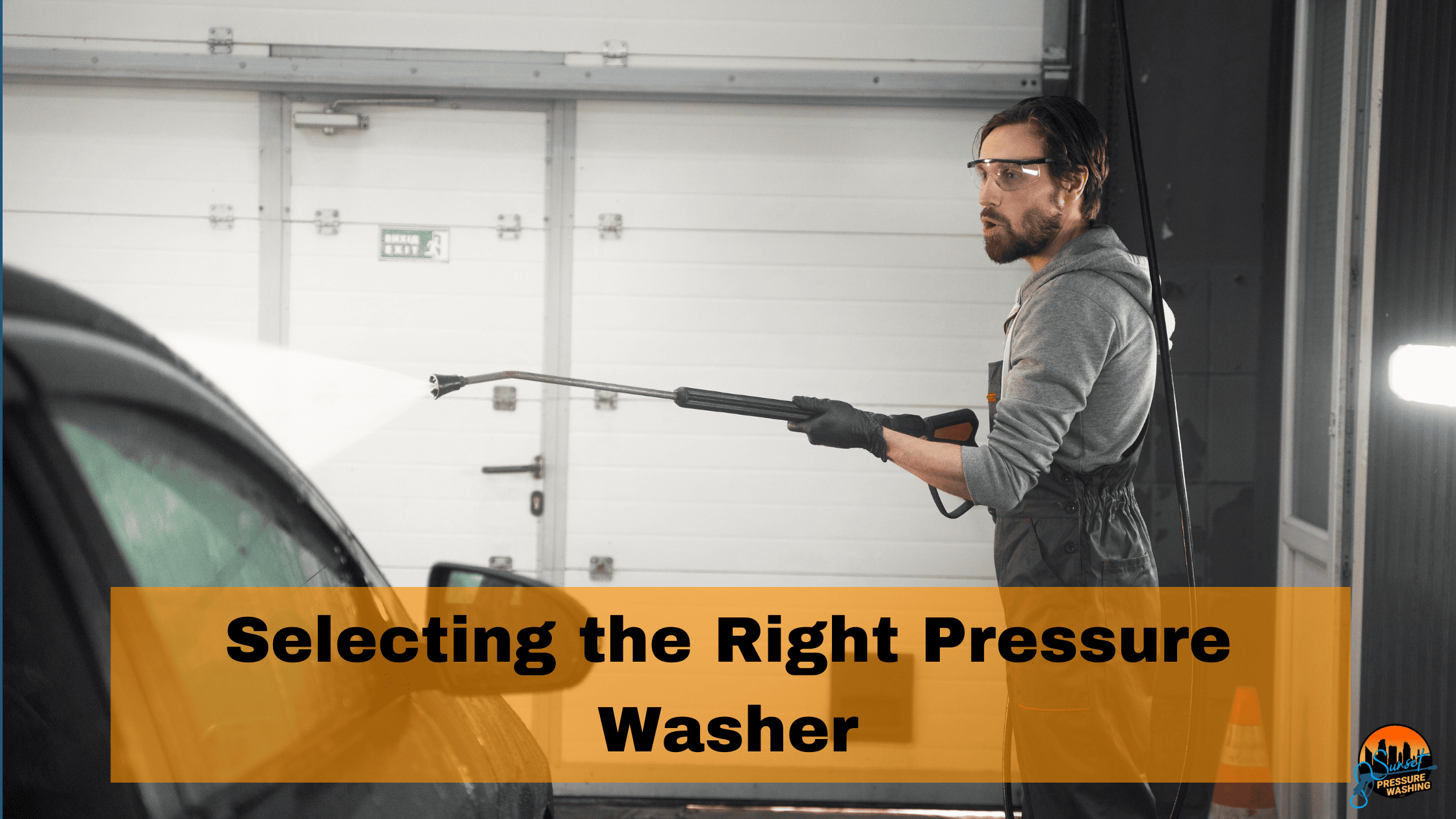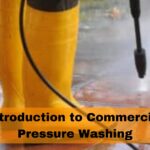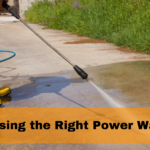
Selecting the Right Pressure Washer
Understanding Pressure Washer Types
When it comes to pressure washers, the variety available can be overwhelming. It’s essential to understand the different types to select the one that best suits your needs. Generally, pressure washers are categorized into three main types: electric, gas-powered, and industrial.
Electric Pressure Washers
These are the most common for residential and light commercial use. Electric pressure washers are quieter, lighter, and generally easier to handle than their gas-powered counterparts. They are perfect for cleaning cars, small patios, outdoor furniture, and other less demanding tasks. The convenience of just plugging them into a standard power outlet makes them highly accessible for most users.
Gas-Powered Pressure Washers
Gas-powered models are more powerful than electric ones and are suitable for medium to heavy-duty tasks. They are ideal for cleaning large areas, such as driveways, siding, and decks. These pressure washers are more portable as they don’t require a power outlet, but they are louder, heavier, and generally require more maintenance. They are a go-to choice for professionals and those needing extra cleaning power.
Industrial Pressure Washers
For the most demanding cleaning tasks, industrial pressure washers are the top tier. These machines are built for daily, intensive use and can handle the toughest grime and dirt. They often come with high PSI and GPM ratings and may offer features such as hot water cleaning for effective grease and oil removal. Industrial pressure washers are typically used in commercial environments like construction sites, large agricultural facilities, and industrial cleaning operations.
Making the Right Choice
Your choice among these types should be based on your specific cleaning needs, the frequency of use, and the environment in which you’ll be using the machine. For infrequent, light tasks, an electric pressure washer might suffice. For more regular or demanding tasks, a gas-powered model is advisable. If your needs are in the realm of heavy-duty, frequent cleaning, particularly in a commercial setting, an industrial pressure washer is the most suitable choice.
Evaluating PSI and GPM Ratings
When selecting a pressure washer, two of the most crucial factors to consider are PSI (Pounds per Square Inch) and GPM (Gallons Per Minute). These metrics determine the cleaning power of the pressure washer and are key to choosing a model that matches your specific cleaning requirements.
Understanding PSI: Pressure Intensity
PSI measures the pressure exerted by the water stream. It’s the force that helps break apart and remove dirt and grime from surfaces. A higher PSI means a stronger water jet, capable of tackling tougher, more stubborn stains and debris.
- Light-Duty Cleaning: For tasks like washing cars, outdoor furniture, or small patios, a pressure washer with a PSI of 1300 to 1900 is generally sufficient.
- Medium-Duty Cleaning: For larger areas like driveways, sidewalks, or siding, a PSI range of 2000 to 3000 is more appropriate.
- Heavy-Duty Cleaning: For commercial-grade cleaning, such as removing paint or cleaning large, heavily soiled areas, a PSI over 3000 is often required.
Evaluating GPM: Cleaning Efficiency
GPM measures the flow rate of the water. It determines how quickly the pressure washer can clean a surface. A higher GPM means you can cover more area in less time, enhancing cleaning efficiency.
- Efficient Cleaning: A higher GPM will rinse away dirt and debris more quickly, reducing overall cleaning time.
- Water Consumption: It’s also important to consider water usage. A higher GPM means more water is used, which might be a concern in areas with water usage restrictions.
Balancing PSI and GPM
- Matching the Task: It’s vital to find a balance between PSI and GPM that suits your cleaning needs. High PSI with low GPM might be powerful but slow, whereas low PSI with high GPM might be fast but less effective on tough stains.
- Consider the Surface: Delicate surfaces require lower PSI to avoid damage, while tougher surfaces can withstand higher PSI levels.
Considering Portability and Size
When selecting a pressure washer, portability and size are important factors that can significantly impact usability and storage. The right balance between these aspects and the machine’s power can make your cleaning tasks more efficient and less strenuous.
Portability: Moving with Ease
- Physics of Pressure: Pressure washing operates on the basic principle of mechanics – Force applied over an area. Measured in pounds per square inch (PSI), the pressure is what gives water its power to break the bond between the dirt and the surface.
- Impact of High Pressure: High-pressure streams create a forceful impact on the surface, dislodging dirt, grime, and other substances. This is particularly effective for hard, non-porous surfaces.
Size: Storage and Power Balance
The size of the pressure washer affects not only its storage requirements but often its power capacity.
- Storage Space: If you have limited storage space, a compact model might be the best choice. Electric pressure washers are generally smaller and easier to store compared to gas-powered models.
- Power and Size Correlation: Generally, more powerful pressure washers are larger due to their more robust engines and components. When choosing, consider how much power you really need to avoid buying a larger, bulkier model than necessary.
Tailoring to Your Needs
- Home Use: For home users with moderate cleaning needs and limited storage, a compact, portable electric pressure washer is often the ideal choice.
- Commercial Use: For commercial settings where power and durability are paramount, a larger, more robust model may be necessary, despite the larger size and reduced portability.
Analyzing the Power Source
When it comes to selecting the right pressure washer, understanding the power source options available is crucial for making an informed decision that aligns with your cleaning needs and the logistics of your cleaning sites. There are two primary power source options for pressure washers: electric and gas-powered. Each has its advantages and considerations, depending on the type of job you’re undertaking and the availability of power sources at your cleaning location.
Electric Pressure Washers
These models are ideal for users who prefer a quieter, more environmentally friendly option and have access to an electrical outlet near their cleaning area. Electric pressure washers are generally lighter and easier to maintain than their gas-powered counterparts. They are perfect for light to medium-duty cleaning tasks, such as washing cars, outdoor furniture, and decks. However, their mobility might be limited by the length of the power cord and the need for a power outlet, which can be a significant limitation if you’re planning to clean areas far from electrical sources.
Gas-Powered Pressure Washers
These models offer more power and mobility compared to electric ones, making them suitable for more demanding cleaning tasks and larger areas that require deep cleaning. Since they don’t rely on being plugged into an electrical outlet, gas-powered pressure washers can be used in more remote locations without the need for electrical power. They are ideal for stripping paint, cleaning large driveways, and other heavy-duty tasks. However, they require more maintenance, are louder, and emit fumes, making them less suitable for indoor use or in poorly ventilated areas.
Selecting the Right Power Source
The choice between an electric and gas-powered pressure washer ultimately depends on your specific needs:
- For Indoor or Residential Use: Electric pressure washers are more suitable due to their quieter operation and absence of fumes.
- For Outdoor or Commercial Use: Gas-powered pressure washers might be the better choice for their power and portability, especially in locations without easy access to electricity.
Assessing the Need for Hot Water Pressure Washing
When exploring pressure washer options, one critical decision is whether to invest in a hot water pressure washer. Understanding when and why a hot water model might be necessary can help you make a more informed choice that aligns with your specific cleaning requirements. Hot water pressure washers offer distinct advantages over their cold water counterparts for certain tasks, primarily due to the combination of high pressure and hot water which can significantly enhance cleaning efficiency for specific types of dirt and stains.
Benefits of Hot Water Pressure Washing
Hot water pressure washers are particularly effective in situations where you need to remove oil, grease, or other stubborn substances. The hot water helps to break down and dissolve these materials, making it easier to clean surfaces without the need for excessive scrubbing or the use of harsh chemicals. This capability is especially beneficial in industrial or commercial settings where these types of stains are common.
Applications for Hot Water Pressure Washing
Consider a hot water pressure washer if your cleaning tasks fall into any of these categories:
- Automotive and Machinery Cleaning: Perfect for removing grease and oil from engines, parts, and equipment.
- Restaurant and Food Service Areas: Ideal for cutting through grease and food residues on grills, vents, and outdoor seating areas.
- Industrial Cleaning: Effective for cleaning machinery, workspaces, and warehouses with oil or grease buildup.
- Animal Housing: Useful in sanitizing spaces where animals are kept, as hot water can kill bacteria and parasites.
Cost vs. Efficiency
Hot water pressure washers tend to be more expensive than cold water models, both in terms of initial investment and operational costs. This is due to their more complex design, which includes a heating element to warm the water. However, the efficiency and speed at which they can clean may justify the extra expense for businesses or individuals facing tough cleaning challenges regularly.
Environmental and Safety Considerations
The ability to clean effectively with less reliance on chemical cleaning agents is a significant advantage of hot water pressure washing, offering a more environmentally friendly option. Additionally, the use of hot water can kill bacteria and other pathogens, making it a good choice for sanitizing surfaces in addition to cleaning them. However, it’s important to handle hot water with care to avoid burns or other injuries.
Assessing Your Needs
If your cleaning tasks primarily involve light dirt and debris, a cold water pressure washer may suffice. But for heavy-duty cleaning of oil, grease, and grime, or where sanitization is a concern, a hot water pressure washer could be a valuable investment. Consider the types of surfaces you’ll be cleaning, the substances you need to remove, and your budget when deciding whether a hot water pressure washer is right for you.
Exploring Additional Features
When selecting a pressure washer, beyond the basic considerations of power source, PSI, GPM, and whether you need a hot or cold water model, there are additional features that can significantly enhance the convenience, efficiency, and effectiveness of your cleaning tasks. These features, ranging from adjustable nozzles to onboard detergent tanks, can transform a standard pressure washing job into a more manageable and even enjoyable task. Here’s a closer look at some of these additional features and how they can benefit you:
Adjustable Nozzles and Spray Tips
Many pressure washers come with adjustable nozzles or a set of interchangeable spray tips that allow you to change the water pressure and spread depending on the task at hand. This versatility makes it easier to switch between delicate surfaces that require a gentler touch and more durable areas that can withstand a more forceful spray, enhancing the machine’s overall utility.
Onboard Detergent Tanks
Some models include built-in tanks designed to hold cleaning detergents, allowing for a seamless mix of water and cleaner during operation. This feature is particularly useful for tasks that require additional cleaning power beyond what water alone can provide, such as removing stubborn stains or sanitizing surfaces. The convenience of not having to manually apply detergent before washing can save time and ensure a more uniform application of the cleaning solution.
Easy-Start Systems
Gas-powered pressure washers, in particular, can benefit from easy-start systems, which are designed to reduce the effort needed to start the engine. These systems can be a significant advantage, making the pressure washer more user-friendly, especially for those who might find the traditional pull-start mechanisms challenging.
Automatic Shut-Off
An automatic shut-off feature can significantly enhance the lifespan of your pressure washer. This system automatically powers down the machine when it is not in use for a certain period, reducing wear and tear on the pump and saving energy. It’s a practical feature for both safety and maintenance.
Thermal Relief
A thermal relief system helps prevent the pump from overheating when the water remains idle in the pump for too long. By cycling cool water through the pump during these idle times, it protects the machine from damage, ensuring a longer life and consistent performance.
Wheels and Portability Options
For many users, the ability to easily move the pressure washer around is crucial. Models equipped with robust, all-terrain wheels can offer enhanced mobility, making it easier to tackle large areas or move between different job sites. Some models are designed to be especially compact and lightweight, further improving portability.
Hose Length and Quality
The length and durability of the hose can greatly affect how easily you can move around and reach different areas without having to move the machine constantly. High-quality hoses that resist kinking and abrasion can make the cleaning process smoother and more efficient.
Water Filtration Systems
Some pressure washers include built-in filters that protect the pump from debris and water contaminants. This feature can be particularly valuable if you’re using water from a natural source or if your water supply carries a lot of sediment.
Understanding Durability and Maintenance
When investing in a pressure washer, understanding the aspects of durability and maintenance is crucial to ensure that your equipment remains in optimal condition and serves you well over the years. The build quality of a pressure washer affects not only its performance but also its longevity and the frequency of required maintenance. Here’s what you need to know about durability and maintenance to make a well-informed decision and keep your pressure washer running efficiently.
Durability Factors:
- Materials and Construction: The materials used in the construction of a pressure washer, including the pump, frame, and engine, can significantly impact its durability. High-quality materials such as stainless steel or brass for the pump and a robust, corrosion-resistant frame can enhance the machine’s resistance to wear and tear.
- Pump Type: The type of pump (axial cam, triplex, etc.) has implications for durability. For example, triplex pumps are known for their longevity and are commonly found in professional-grade machines. Understanding the differences can help you choose a model that balances performance and durability according to your needs.
- Brand Reputation: Some brands are renowned for their durable and reliable equipment. Researching and choosing a pressure washer from a reputable brand can often lead to a better long-term investment.
Maintenance Considerations:
- Regular Cleaning: After each use, it’s essential to thoroughly clean your pressure washer, including the nozzles and filters, to prevent clogs and buildup that can affect performance.
- Proper Storage: Storing your pressure washer in a clean, dry place can prevent rust and corrosion. If you have a gas-powered model, make sure to follow the manufacturer’s instructions for fuel storage or engine maintenance during off-season periods.
- Pump Maintenance: Regularly check the pump oil level and quality, changing it according to the manufacturer’s recommendations. A well-lubricated pump is crucial for smooth operation and longevity.
- Hose Care: Inspect the hose for kinks, cracks, or wear and replace it if necessary. A damaged hose can be a safety hazard and can also reduce the efficiency of your pressure washer.
- Seals and O-Rings: These components can wear out over time, leading to leaks or loss of pressure. Check them periodically and replace them as needed to maintain optimal performance.
Ease of Maintenance:
- Accessibility of Parts: Choose a pressure washer with easily accessible parts for simple repairs and maintenance. This includes being able to easily purchase spare parts like hoses, nozzles, and seals.
- User-Friendly Design: Some pressure washers are designed with maintenance in mind, featuring easy-to-access components and straightforward procedures for routine checks and repairs.
Understanding Warranty and Support:
A comprehensive warranty can provide peace of mind and protection for your investment. Look for warranties that cover not just the machine but also critical components like the pump and engine. Additionally, consider the manufacturer’s customer support services, as having access to expert advice and service can greatly ease the maintenance process.
Safety Considerations
When operating a pressure washer, safety should be your paramount concern. The powerful spray can cause serious injuries, and the equipment itself poses various risks if not handled correctly. Here are essential safety considerations to keep in mind to ensure a safe and effective cleaning experience.
Read the Manual
Before using a pressure washer, it’s crucial to read and understand the manufacturer’s manual. The manual contains specific instructions for safe operation and maintenance, tailored to your model’s features and capabilities.
Wear Protective Gear
Always wear appropriate protective gear when operating a pressure washer. This includes safety goggles to protect your eyes from debris, durable gloves to safeguard your hands, and ear protection if you’re using a gas-powered model. Closed-toe shoes and long pants can also provide additional protection against flying debris.
Be Aware of Your Surroundings
Ensure that the area you’re cleaning is clear of other people, especially children and pets. Be mindful of potential hazards, such as electrical lines, slippery surfaces, and objects that could ricochet.
Use the Correct Settings and Attachments
Select the appropriate pressure settings and nozzles for the task at hand. Using too high a pressure or the wrong attachment can damage surfaces and increase the risk of injury.
Avoid Direct Jet Contact with Skin
Never direct the pressure washer’s jet onto people, animals, or yourself. The high-pressure water can penetrate the skin and cause serious injuries.
Handle Chemicals with Care
If you’re using detergents or other chemicals, handle them carefully and follow the manufacturer’s instructions for use. Wear protective gear to prevent skin and eye contact with these substances.
Secure the Area
When working in public spaces or around others, secure the area to prevent bystanders from entering. Use cones, tape, or signs to mark the workspace.
Check Equipment Before Use
Inspect the pressure washer and all attachments for damage or wear before each use. Check hoses for leaks, ensure connections are secure, and replace any damaged parts immediately.
Know How to Shut Off the Equipment Quickly
Familiarize yourself with the pressure washer’s emergency shut-off controls. Being able to quickly turn off the machine in an emergency can prevent accidents.
Avoid Using Ladders
The recoil from a pressure washer can lead to falls when used on a ladder. For high areas, use extension wands or consider hiring professionals.
Electrical Safety for Electric Models
If using an electric pressure washer, ensure it’s plugged into a ground fault circuit interrupter (GFCI) outlet to protect against electrical shock. Avoid using extension cords, as they can be a tripping hazard and may not provide adequate electrical safety.
Proper Storage
After use, store the pressure washer and its attachments in a safe, dry place out of the reach of children. Drain any water from the machine to prevent freezing and damage in colder temperatures.
Comparing Costs and Warranty
When choosing a pressure washer, the cost and warranty are significant factors that can influence your purchasing decision. These elements not only affect the initial investment but also the long-term value and peace of mind that comes with your purchase. Understanding how to compare costs and evaluate warranty offerings can help you select a pressure washer that offers the best balance between price, features, and protection.
Comparing Costs:
- Initial Purchase Price: The upfront cost of a pressure washer can vary widely based on its type (electric, gas-powered, hot water), power (PSI and GPM ratings), and additional features. While it might be tempting to opt for the cheapest option, consider how the machine’s specifications and capabilities align with your cleaning needs. A higher initial investment in a more suitable model can save money in the long run by reducing the need for replacements or upgrades.
- Operational Costs: Beyond the purchase price, consider the operational costs associated with the pressure washer. Gas-powered models may have higher fuel costs and maintenance requirements compared to electric models, which might have lower energy costs but could require access to a power source.
- Efficiency and Effectiveness: A more powerful and efficient pressure washer can complete tasks quicker and with less water, potentially saving on water bills and time. Evaluate the cost benefits of models with higher PSI and GPM ratings or those with hot water capabilities if you’re dealing with greasy or oily clean-up jobs.
Evaluating Warranty
- Length of Warranty: The warranty length can vary from one year to several years, depending on the manufacturer and model. A longer warranty period often indicates the manufacturer’s confidence in their product’s durability and can offer you more extended protection against defects or failures.
- Coverage Details: Carefully review what the warranty covers. Some warranties might only cover the pump or engine, while others include coverage for the frame, hoses, and accessories. Understanding the specifics can help you assess the true value of the warranty.
- Service and Support: Consider the manufacturer’s reputation for customer service and support. A warranty is only as good as the company’s willingness and ability to fulfill its commitments. Look for brands known for responsive customer service and straightforward warranty claim processes.
- Cost of Ownership: Factor in the potential savings from a comprehensive warranty that covers costly repairs or parts. A robust warranty can significantly reduce the total cost of ownership over the life of the pressure washer.
Making an Informed Decision:
When comparing costs, it’s essential to look beyond the sticker price and consider the efficiency, operational costs, and the specific cleaning tasks you need the pressure washer for. Similarly, a strong warranty offering can add significant value, offering protection against unforeseen expenses and ensuring your investment is safeguarded.
Consulting Professional Reviews and User Feedback
Before finalizing your decision on a pressure washer, consulting professional reviews and user feedback is an invaluable step. This approach offers insights into real-world performance, durability, and the overall satisfaction levels of users like yourself. Professional reviews provide an expert perspective on the technical aspects and comparative performance of different models, while user feedback highlights the practical experiences and potential issues encountered by everyday users. Here’s how to effectively utilize these resources:
Professional Reviews:
- Expert Analysis: Look for reviews from trusted industry publications or websites specializing in home improvement or outdoor equipment. These reviews often include detailed analysis of a pressure washer’s performance, ease of use, and how it stacks up against similar models in terms of features and value.
- Comparative Tests: Many professional reviewers conduct comparative tests that pit similar pressure washers against each other. These tests can reveal how a model performs under various conditions and tasks, providing a clearer picture of its strengths and weaknesses.
- Objective Insights: Professional reviews can offer objective insights into the durability and maintenance requirements of different pressure washers, helping you understand what to expect in terms of long-term use and upkeep.
User Feedback:
- Real-World Experiences: User reviews on retailer websites, forums, and social media can provide a wealth of information on how a pressure washer performs in everyday situations. Look for feedback from users who have tackled similar cleaning tasks to those you anticipate.
- Longevity and Reliability: Pay attention to comments regarding the longevity and reliability of the pressure washer. Users often share their experiences with the durability of the machine and any issues they’ve encountered over time.
- Customer Service Experiences: User feedback can also shed light on the manufacturer’s customer service quality. Positive or negative experiences with warranty claims, parts replacements, and general support can influence your decision, especially when considering the long-term relationship with the brand.
Balancing Reviews and Feedback:
- Look for Consistency: When sifting through reviews and feedback, look for consistent patterns or comments about specific aspects of the pressure washer. Repeated praise or complaints about particular features or performance areas can be telling.
- Consider Your Needs: Keep your specific needs and expectations in mind when reading reviews and feedback. What may be a deal-breaker for one user might not be as critical for your situation.
- Balance Perspectives: Balance the insights gained from professional reviews with the practical experiences shared in user feedback. This comprehensive approach will give you a well-rounded understanding of each pressure washer’s potential fit for your needs.
Choosing the Right Pressure Wash
When it comes to selecting the right pressure washer for your needs, Sunset Pressure Wash stands out as a premier provider, offering a comprehensive range of top-quality pressure washers suitable for a wide variety of tasks. Whether you’re tackling residential cleaning projects or facing heavy-duty commercial jobs, Sunset Pressure Wash has the expertise and equipment to ensure you find the perfect match for your requirements.
Visit our website at Sunset Pressure Wash to browse our extensive selection of pressure washers. Discover the perfect model that meets your cleaning needs and budget. Understand more about us, Sunset Pressure Wash, and how we’ve become a trusted name in pressure washing. Gain insights into our commitment to quality and customer service excellence.
Ready to take the next step? Book a consultation with our experts via Housecall Pro. We’ll help you assess your needs and guide you to the best pressure washer choice for your projects.






